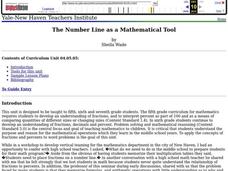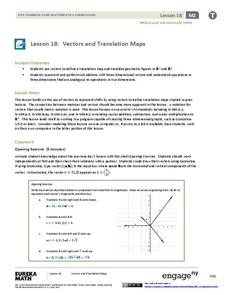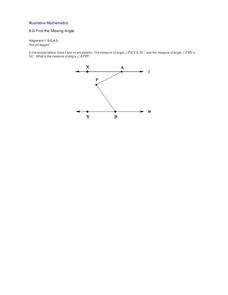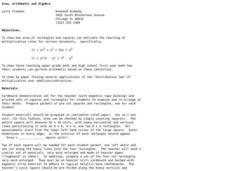PBS
Adding Integers
Your sixth and seventh graders deepen their understanding of a number line and adding integers in this concrete, hands-on activity. Learners play "Warehouse Puzzle" and then discuss their game strategies and the characteristics...
Curated OER
Fraction City
Welcome to Fraction City! This is an incredibly interactive and fun way to teach properties of fractions, and reaches multiple learning styles. Scholars create "blocks" by folding strips of paper in various increments (thirds, fourths,...
Mathematics Vision Project
Module 7: Modeling with Functions
The sky's the limit of what you create when combining functions! The module begins with a review of transformations of parent functions and then moves to combining different function types using addition, subtraction, and...
EngageNY
Directed Line Segments and Vectors
Investigate the components of vectors and vector addition through geometric representations. Pupils learn the parallelogram rule for adding vectors and demonstrate their understanding graphically. They utilize the correct notation and...
Curated OER
Building a Quadratic Function Form
Comparing the movement of graphs geometrically when small changes are made to the parent function motivates this collaborative discussion on the transformations of functions to their various forms. Vertical and horizontal shifts due to...
EngageNY
Stretching and Shrinking Graphs of Functions
Why is that graph wider? Pupils learn about stretching and shrinking graphs of square root, absolute value, cubic, and quadratic functions. They study both vertical and horizontal stretches and shrinks in addition to reflections.
Curated OER
Number and Operations: Webbing Our Way Through Numbers
Second graders explore estimation and place value. For this place value lesson, 2nd graders estimate and construct numbers while working with spider activities. Students use addition and subtraction to compare estimates. Resources and...
EngageNY
The Graph of the Natural Logarithm Function
If two is company and three's a crowd, then what's e? Scholars observe how changes in the base affect the graph of a logarithmic function. They then graph the natural logarithm function and learn that all logarithmic functions can be...
Curated OER
High Mountain Retreat
Students explore and analyze atmospheric conditions for a high mountain retreat. They examine the relationship between altitude, atmospheric pressure, temperature and humidity at a particular location. In addition, they write reports...
Curated OER
Does Your Field Measure Up
Students measure angles using a plane table kit. In this geometry lesson plan, students use trigonometric identities to find the values of the length of a football field.
Curated OER
Polynomials Functions
High schoolers factor polynomials and linear functions and apply concepts of the fundamental theorem of algebra to solve problems. They graph their solutions and analyze the graph.
Curated OER
The Number Line
Learners graph and order numbers using a number line. They also solve word problems using fractions and decimals and rewrite equations to solve problems correctly. Several example word problems are given.
EngageNY
Vectors and Translation Maps
Discover the connection between vectors and translations. Through the activity, learners see the strong relationship between vectors, matrices, and translations. Their inquiries begin in the two-dimensional plane and then progress to the...
Illustrative Mathematics
Find the Missing Angle
This one activity requires young geometers to pull together information they are currently learning with things they have learned previously. Here they rely on understanding something about parallel lines, alternative interior angles,...
Curated OER
Area, Arithmetic and Algebra
Explore the concept of this perfect square trinomial and difference of squares instructional activity. A hands-on activity that uses paper rectangles and squares to illustrate the perfect-square trinomial and difference of squares formulas.
Curated OER
Penny Moves
Students explore math functions by completing a worksheet in class. In this spatial movement lesson, students utilize a four square grid and a penny to practice moving the coin horizontally, vertically and diagonally as instructed....















